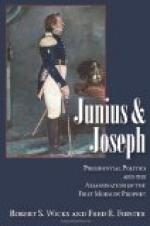She was not aware that she had moved in her sleep or dreamed. She was greatly refreshed and again unreasonably light-hearted. She opened her shutters and saw that the dawn was calm and fair. As yet the sleeping town had scarcely stirred.
“It is better to go out than to stay in,” she said to herself as she remembered that this hour would be her one chance of taking air and exercise unobserved. She heard the main door of the house open and, looking over the banister, saw a slattern with bucket and mop passing into some back passage. She went lightly down and out into the fresh frosty air.
What had that dream been concerning the river bank on the south-western side? She could not recall it, nor had she ever explored the streets of white wooden villas and cottages that lay upon that side. She went thither now. There was no reason why she should not go, no reason to go elsewhere. It was a pleasant walk. When she had passed the last house, the bank sloped in open uncared-for grass where cows were grazing. Only here and there she had seen a house-door open, and as yet in this place no one was abroad except a boy who was playing idly in a boat, which was drawn half up on the muddy bank.
The broad river, milk-white under a dappled sky, stretched south and west. The other side was dim and blue in the faint vapour of the relaxing frost. The air was sweet and still. The sunbeams, imprisoned in eastern vapour, shone through the white veil with soft glow that cast no shadow but comforted the earth with hope.
Susannah had a further thought in her mind now, but she felt no haste or impatience of excitement.
The boy was of an active, restless disposition or he would hardly have been out so early. Lithe and idle, he sat see-sawing in the floating end of the boat, uncertain how to amuse himself. He returned Susannah’s greeting with a lively flow of talk.
“You don’t know how to row,” said Susannah.
She showed no eagerness, for she felt none. The hope she had just formed was most uncertain, for it appeared not at all likely that she could escape in this way without being molested.
“I bet I can row,” said the boy, “as well as any man in town.”
“That isn’t saying much,” said Susannah. “The men about here have very few boats, and they are most of them afraid to go on anything smaller than the steamer.”
“I could row t’other side and back,” bragged the boy. “I could row t’other side and back three times in the day.”
“You couldn’t.”
“I couldn’t! What will you bet?”
“I suppose your father wouldn’t allow you to go, anyway.”
He was a fresh-faced, mischievous, eager young rascal, and he found Susannah’s manner pleasant and provoking.
“Will you lay five dollars on it?” he
cried. “Pap is away down to
Quincy. If you’ll lay five dollars on it
I’ll do it.”
“But I won’t.”




